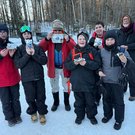Oktyabrsky, Gallis receive grants
Two SUNY Polytechnic Institute professors have been selected to receive a total of $330,000 from two separate nanoscience- and nanoengineering-focused grants:
— Serge Oktyabrsky, professor of nanoscience, has been awarded $200,000 from the United States Department of Energy for research aiming to demonstrate a scintillation detector that, upon detection of small particles, can emit measurable light with unsurpassed speed and yield. This greater sensitivity and speed is essential for several DOE High Energy Physics areas of research, and could help to detect the interaction of quantum particles to better understand their properties and actions, for example, in addition to the potential for medical and nuclear security applications; and
— Spyros Gallis (Spyridon Galis), assistant professor of nanoengineering, was awarded $130,000 by the National Science Foundation — Directorate of Engineering for research that will help develop critical physical properties and provide a fundamental understanding of new silicon carbide photonic nanostructures that have erbium ions added to them for the realization of high-temperature CMOS-compatible quantum emitters at telecommunications wavelengths.
The emission from erbium ions at telecommunication wavelengths can be controlled and amplified by these photonic nanostructures and can improve light-based devices, with applications in areas such as biological imaging and sensing, quantum storage of single-photons, and long-distance quantum communications.
Both research projects will provide hands-on learning opportunities to SUNY Poly students. In Oktyabrsky’s lab, a graduate student will build the scintillation detector and perform its initial testing, along with support from two SUNY Poly staff scientists.
Gallis’s research project will provide first-hand laboratory experience for both undergraduate and graduate students at SUNY Poly, as well as summer interns, who will simulate with numerical calculations the theoretical behavior of erbium emissions in the photonic nanostructures.
News of these latest grants follows other recent research funding announcements by SUNY Poly, including:
— Woongje Sung, associate professor of nanoengineering, was selected to receive $2,078,000 in total federal funding from the U.S. Army Research Laboratory for advancing the “MUSiC,” or the Manufacturing of Ultra-high-voltage Silicon Carbide devices for more robust power electronics chips with a range of military and commercial applications;
— Nate Cady, professor of Nanobioscience, was recently awarded $500,000 in funding from the National Science Foundation to develop advanced computing systems based on a novel approach to the creation of non-volatile memory architecture;
— Janet Paluh, associate professor of nanobioscience, was recently awarded more than $970,000 from the New York State Health Department—Spinal Cord Injury Research Board for collaborative research using nanotechnology and human stem cell-derived neural cell therapies to create an effective treatment platform for spinal cord injuries in patients, in addition to a $162,000 sub-award from the New York State Health Department—NYSTEM Innovative, Developmental, or Exploratory Activities (IDEA) program for collaborative research with the University at Albany to identify new types of injury and repair biomarkers based on cell communication to benefit prognosis or diagnosis of traumatic brain injuries; and
— Michael Fasullo, associate Professor of Nanobioscience, was awarded $446,000 by the National Institutes of Health National Institute of Environmental Health Sciences to investigate with a number of partners how genetics can increase the risk of diet-associated colon cancer.


